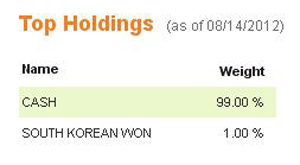IQ South Korea Small Cap ETF (SKOR) will de-list and close to new investors as of August 17. Sponsor Index IQ announced the SKOR closure in a July 6 news release (pdf). The release did not reveal SKOR would become the equivalent of a money market fund well before its August 17 closure. Yet this appears to be what happened.
We were optimistic for SKOR when it launched in 2010; there was not (and is still not) any other ETF covering the South Korea small cap segment. Investors seemed uninterested, however, and SKOR never gained any traction. Three other Index IQ ETFs were also ahead of their time. IQ Taiwan Small Cap ETF (former ticker TWON), IQ Hong Kong Small Cap ETF (former ticker HKK), and IQ Japan Mid Cap ETF (former ticker RSUN) were shuttered in December 2011.
The SKOR closure was formally disclosed in a prospectus supplement dated July 6, 2012 (pdf). The second paragraph of the supplement states “From August 20, 2012 through August 21, 2012, the Fund will be in the process of closing down and liquidating its portfolio. This process will result in the Fund not tracking its underlying index and its cash holdings increasing, which may not be consistent with the Fund’s investment objective and strategy.”
In fact, the manager liquidated SKOR and ceased tracking its index well before August 20. As of August 14, SKOR’s holdings consisted of 99% cash (presumably $US) and 1% South Korean Won. Here is a screen shot from the Index IQ web site showing August 14 holdings.
 What this means is that SKOR is effectively a money market fund already. It no longer holds any stocks, South Korean or otherwise, and does not even attempt to replicate its benchmark index.
What this means is that SKOR is effectively a money market fund already. It no longer holds any stocks, South Korean or otherwise, and does not even attempt to replicate its benchmark index.
This was about to happen anyway, of course, as a necessary step in the closure process. The prospectus supplement admits as much – but it should not have happened yet, as far as we can tell. SKOR should still track its index until August 17. It is not.
Note, also, that as of today SKOR is still open to new investment. Trading activity is almost non-existent at this point; our ETF Field Guide shows average daily volume in SKOR at 2,000 shares or less. Nevertheless, Index IQ appears to be offering a security to the public that, based on the sponsor’s own materials and SEC filings, should still be holding South Korean stocks but in fact holds only cash.
The 0.79% SKOR expense ratio makes it a very expensive money market fund. We contacted the Index IQ media representative by phone early yesterday seeking information on the porfolio’s current status, but as of publication time had received no response.
Patrick Watson contributed to this article.